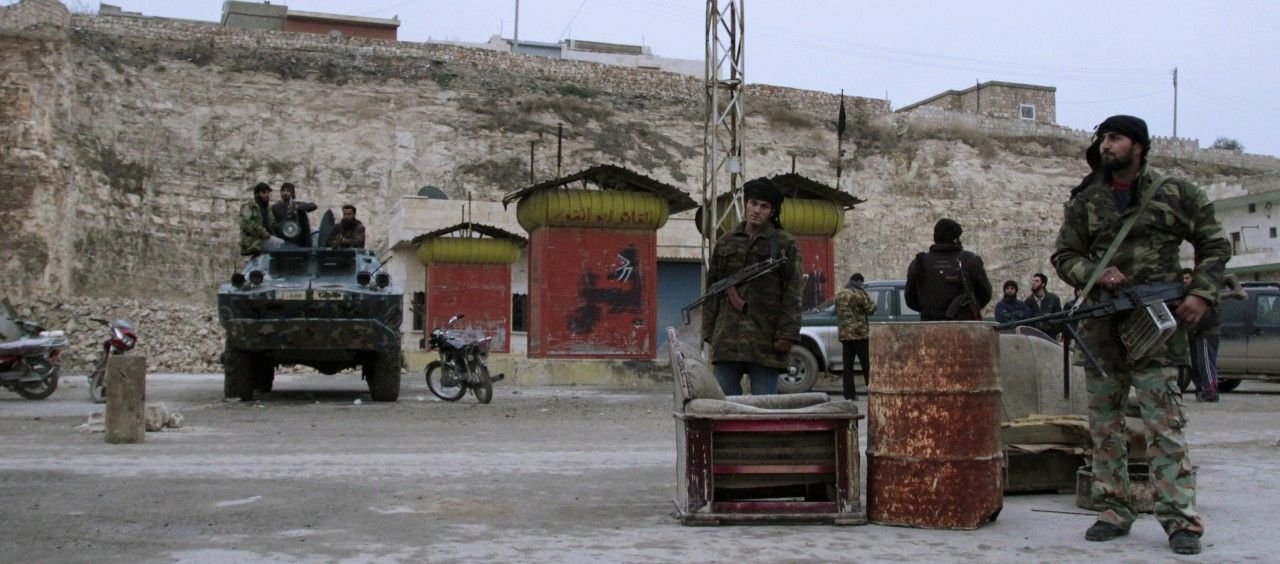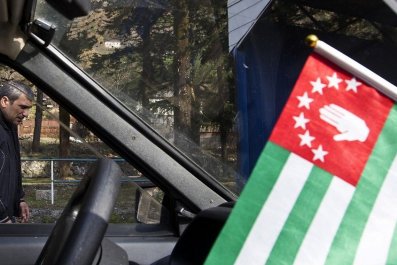Three years into what was optimistically called an "Arab Spring," the burning question now is, Who lost the Middle East?
As Arab governments weaken, states disintegrate, old borders disappear, extremists gain and sectarian partisans fight each other, it's also worth asking whether America's aloof attitude can be sustained for much longer.
President Obama's critics accuse his administration of neglecting a region where, regardless of public opinion, American interests remain strong. Ending the Iraq war without signing an agreement with Baghdad, which would have left a residual United States presence, and staying away from the Syrian civil war has convinced some Middle Easterners that America is no longer interested in the region - or has no power to influence it.
With a little investment, America could still help shape the region, argue proponents of deeper involvement. The antidote to the breakup of the old states, which are no longer held together by dictators, could well be decentralization - creating loose federations out of states where tribal factions are currently at each others' throats.
"The centralized state has failed, requiring a new paradigm in which power is devolved from the center to local communities, where they can exercise self-government," Jamal Benomar, the United Nations secretary general's special envoy in Yemen, told me.
But is Washington interested in steering the region's states toward a decentralized future - or steering them anywhere, for that matter?
Obama "has shown himself to be deeply reluctant to commit to any initiative designed to shape a new regional order," said the Brookings Institution's Michael Doran, who served at the National Security Council during the George W. Bush administration. "This standoffishness has resulted in a power vacuum - which is most obvious in Syria - in which Iran and Al Qaeda are both growing increasingly more powerful even as they vie with each other for influence."
America's absence and the void left behind by its departure threaten the existence of states with old borders drawn by European colonialists at the end of World War I. The Sykes-Picot Agreement - based on straight-line borders drawn in 1916 by the British diplomat Mark Sykes and his French colleague Francois Georges Picot - is about to end.
Or is it? "The region's modern states are not a hundred percent imperialist inventions," says historian Amatzia Baram, director of Iraq studies at Israel's Haifa University. Rather, he says, current borders are based on entities dating back to the early rise of Islam in the Middle East. And after living for centuries in a cohesive state, with distinct "bureaucracy, institutions, culture, even vernacular," Iraq's Sunnis, and its Shiites, "are Iraqi first," he argues.
But he acknowledges that Syria has been broken, Lebanon is under threat, and the future as cohesive national units of countries like Yemen, Bahrain and others, including Iraq, is threatened. Much needs to be done, including by American leadership, to put them back together again.
Iraq, where America conducted an eight-year war culminating in a victory over Al Qaeda and a short-lived Pax Americana, is back at war. Last week an Al Qaeda-affiliated group known as ISIS captured the cities of Ramadi and Fallujah in western Iraq, a Sunni stronghold. The group's full name - the Islamic State of Iraq and al-Sham (greater Syria) - is indicative of its aim: uniting existing Arab countries under a jihadi banner.
Meanwhile, last week oil started flowing in a pipeline between the Kurdish areas and the Mediterranean port of Ceyhan in Turkey, through which some 2 million barrels of crude could eventually flow to European markets each day. Remarkably, the central government in Baghdad was left out of the negotiation between leaders of the increasingly autonomous Kurdish enclave of northern Iraq and Ankara. Iraqi Prime Minister Nouri al-Maliki's government is, naturally, furious.
Washington officials argue that Iraq's current hostilities cannot be blamed on the administration's failure to secure a status of force agreement with al-Maliki, which would have left a residual contingency of U.S. troops to help the Iraqis repel the jihadis.
"When we had 160,000 troops in the country, it didn't negate sectarian tensions," State Department spokeswoman Marie Harf told reporters this week. "When we had 160,000 troops in Iraq, the border with Syria was still incredibly porous." Yet, imagine if a small American force had been left behind, and even had enjoyed some limited success, "For what - 10 years? 20 years? 30 years? Where does it end? That's not a long-term solution," said Harf.
Similarly, the Obama administration has argued against an "American solution" to the carnage in Syria, especially not one involving "boots on the ground." Syria is now divided into at least three sections. The coastal area is controlled by President Assad's Alawites, the north and east by various Sunni groups - many of which fight among themselves - and some enclaves are controlled by Kurds.
In addition to spreading to Iraq, Syria's war has migrated to neighboring Lebanon, long a symbol of the uneasy co-existence between Sunnis, Shiites, Druze and Maronite Christians. The country is fast reverting back to civil war, complete with car bombings, assassinations and increasing chaos in centers of population.
Despite a planned January 22 conference in Switzerland, where some of Syria's warring factions are expected to attend alongside interested outsiders, few predict that the Syrian war can end soon. This week the United Nations announced it is going to stop estimating the numbers of casualties in the civil war; at the last count there were approximately 100,000 deaths.
"The goal of your policy should be to build up a third force in Syria - an alternative to both Iran and Al Qaeda," says Doran. Such an alternative would "function as a valuable ally on the ground" and "ensure the United States [is] the dominant voice in all Syria discussions."
If Syria were to become an American ally it may eventually acquiesce to a constitutional agreement similar to one reached late December in Yemen.
Yemen's southerners have long been neglected by its capital, Sana'a. As the country's president, Ali Abdullah Salleh, was forced out, tribes turned against each other. Jihadi Sunnis from across the region soon flocked in, creating Al Qaeda strongholds, and Hezbollah came in to fight on behalf of the country's Shiites.
"Centrifugal forces were threatening to break apart the centralized state, particularly with the emergence of a secessionist movement in the south," said Benomar. He facilitated negotiations that led Yemenis to conclude that the only way forward was to create a new federal state.
After much coaxing, he managed to get all political leaders to sign an agreement to this effect. The new pact envisions a federal state, with strong autonomous regions controlling much of the goings-on inside their territories. Sana'a will remain the capital, with much-weakened governing responsibilities, such as steering national foreign policy.
Details, including how many states will be part of the new federation, are yet to be worked out, and the outsiders and spoilers may yet kill the plan. But the first formal agreement creating a federal union out of an old Arab dictatorship, which was only held together by dictatorial force, is now in the books.
According to Baram, a similar pact can solve much of Iraq's problems as well. The Sunnis, he says, would love to have the same degree of autonomy enjoyed by the Kurds. With some help from Baghdad, they can chase away the foreign jihadis - which they mostly abhor - as they did in 2008.
But "the devil is in the details," Baram cautions. Before they left Iraq, Americans became good at dealing with tribal leaders. That kind of American involvement is necessary for creating an equitable federation out of the old Iraqi order.
Syria, too, can benefit from such an arrangement, Baram adds. The Sunnis control areas where there is oil, as well as water and other essentials. But Assad's Alawites control access to the sea. So the best solution is to create self-governing Syrian autonomies alongside a federal government in Damascus.
Administration critics say, however, that for that to come about, America needs to reestablish itself as a leader in the region. The Obama administration has "abdicated the traditional U.S. leadership role," says Doran. "Building a coalition does not necessarily mean putting U.S. boots on the ground, but it does mean leading," he said.
With no American involvement, anti-American jihadists may well take over.
And a jihadi takeover, Doran fears, may well force American troops back to the region. If so, he says, "We should start shaping the region now, on our own terms, rather than being forced to do things precipitously on somebody else's terms."
Follow Benny Avni on Twitter: @bennyavni
























